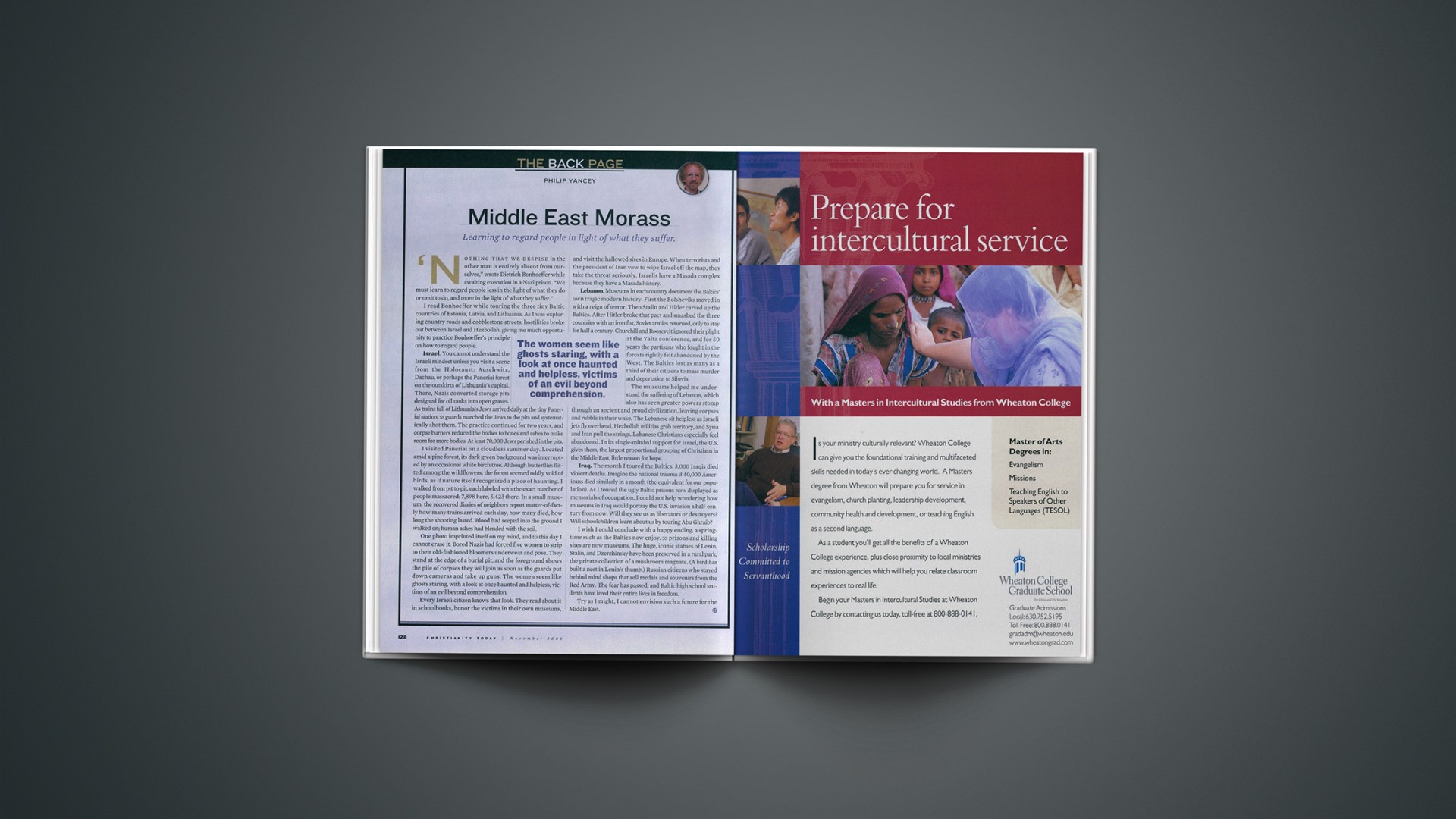“Nothing that we despise in the other man is entirely absent from ourselves,” wrote Dietrich Bonhoeffer while awaiting execution in a Nazi prison. “We must learn to regard people less in the light of what they do or omit to do, and more in the light of what they suffer.”
I read Bonhoeffer while touring the three tiny Baltic countries of Estonia, Latvia, and Lithuania. As I was exploring country roads and cobblestone streets, hostilities broke out between Israel and Hezbollah, giving me much opportunity to practice Bonhoeffer’s principle on how to regard people.
Israel. You cannot understand the Israeli mindset unless you visit a scene from the Holocaust: Auschwitz, Dachau, or perhaps the Paneriai forest on the outskirts of Lithuania’s capital. There, Nazis converted storage pits designed for oil tanks into open graves. As trains full of Lithuania’s Jews arrived daily at the tiny Paneriai station, ss guards marched the Jews to the pits and systematically shot them. The practice continued for two years, and corpse burners reduced the bodies to bones and ashes to make room for more bodies. At least 70,000 Jews perished in the pits.
I visited Paneriai on a cloudless summer day. Located amid a pine forest, its dark green background was interrupted by an occasional white birch tree. Although butterflies flitted among the wildflowers, the forest seemed oddly void of birds, as if nature itself recognized a place of haunting. I walked from pit to pit, each labeled with the exact number of people massacred: 7,898 here, 5,423 there. In a small museum, the recovered diaries of neighbors report matter-of-factly how many trains arrived each day, how many died, how long the shooting lasted. Blood had seeped into the ground I walked on; human ashes had blended with the soil.
One photo imprinted itself on my mind, and to this day I cannot erase it. Bored Nazis had forced five women to strip to their old-fashioned bloomers underwear and pose. They stand at the edge of a burial pit, and the foreground shows the pile of corpses they will join as soon as the guards put down cameras and take up guns. The women seem like ghosts staring, with a look at once haunted and helpless, victims of an evil beyond comprehension.
Every Israeli citizen knows that look. They read about it in schoolbooks, honor the victims in their own museums, and visit the hallowed sites in Europe. When terrorists and the president of Iran vow to wipe Israel off the map, they take the threat seriously. Israelis have a Masada complex because they have a Masada history.
Lebanon. Museums in each country document the Baltics’ own tragic modern history. First the Bolsheviks moved in with a reign of terror. Then Stalin and Hitler carved up the Baltics. After Hitler broke that pact and smashed the three countries with an iron fist, Soviet armies returned, only to stay for half a century. Churchill and Roosevelt ignored their plight at the Yalta conference, and for 50 years the partisans who fought in the forests rightly felt abandoned by the West. The Baltics lost as many as a third of their citizens to mass murder and deportation to Siberia.
The museums helped me understand the suffering of Lebanon, which also has seen greater powers stomp through an ancient and proud civilization, leaving corpses and rubble in their wake. The Lebanese sit helpless as Israeli jets fly overhead, Hezbollah militias grab territory, and Syria and Iran pull the strings. Lebanese Christians especially feel abandoned. In its single-minded support for Israel, the U.S. gives them, the largest proportional grouping of Christians in the Middle East, little reason for hope.
Iraq. The month I toured the Baltics, 3,000 Iraqis died violent deaths. Imagine the national trauma if 40,000 Americans died similarly in a month (the equivalent for our population). As I toured the ugly Baltic prisons now displayed as memorials of occupation, I could not help wondering how museums in Iraq would portray the U.S. invasion a half-century from now. Will they see us as liberators or destroyers? Will schoolchildren learn about us by touring Abu Ghraib?
I wish I could conclude with a happy ending, a springtime such as the Baltics now enjoy. ss prisons and killing sites are now museums. The huge, iconic statues of Lenin, Stalin, and Dzerzhinsky have been preserved in a rural park, the private collection of a mushroom magnate. (A bird has built a nest in Lenin’s thumb.) Russian citizens who stayed behind mind shops that sell medals and souvenirs from the Red Army. The fear has passed, and Baltic high school students have lived their entire lives in freedom.
Try as I might, I cannot envision such a future for the Middle East.
Copyright © 2006 Christianity Today. Click for reprint information.
Related Elsewhere:
Yancey’s Christianity Today columns since 1997 are available on our site.
CT has full coverage of the Israel-Hezbollah conflict, Israel, Lebanon, and Iraq.










